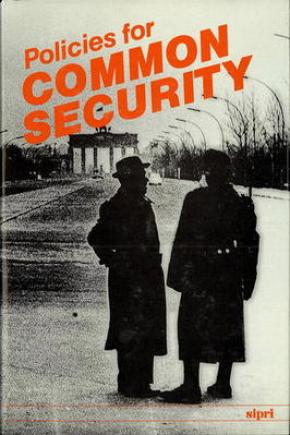Policies for Common Security

On 25 April 1982 the Independent Commission on Disarmament and Security Issues-commonly known as the Palme Commission-adopted its first Final Report. It was published that same year, under the title 'Common Security', thus introducing a new term into the language of debate.
The basic idea of common security is not complex. It is that no country can obtain security, in the long run, simply by taking unilateral decisions about its own military deployment. This is because security depends also on the actions and reactions of potential adversaries. Security has to be found in common with those adversaries. In the words of the Palme Commission's report, 'States can no longer seek security at each other's expense; it can be obtained only through cooperative undertakings'.
SIPRI convened a conference to undertake a critical examination of the concept of common security and to consider the implications of the idea for disarmament and arms control policy. This book contains the main papers presented at the conference.
This title was reissued by Routledge in August 2019. For further information, permission requests or to place an order, please contact the publisher directly.
Introduction
R. Väyrynen
Part I. Conceptual and political underpinnings of common security
1. Common insecurity
S. Bok
2. Observations on the principle of common security
E. Bahr
3. The concept of common security
M. Kaldor
4. Thoughts on the concept of common security
S. Hoffmann
5. The Soviet concept of security
V. V. Zagladin
6. Common security and the Third World
L. Mojsov
Part II. Deterrence and common security: Alternative perspectives
7. Common security and deterrence
E. Rothschild
8. The death of deterrence
A. Krass
9. Common security and the limitation of war
T. C. Schelling
10. Unilateral actions as confidence-building measures
J. B. Wiesner
11. Atlantism, pacifism and common security in Europe
J.-P. Cot
Part III. Disengagement, alternative defence and common security in Europe
12. Policies of common security in Europe
S. Lodgaard
13. The détente process and common security
M. Saeter
14. Common security and defensive security
A. Mertes
15. Confidence building and nuclear weapons in Europe
J. J. Holst
16. On the issue of a chemical weapon-free zone
Kh. Lohs
Address by Dr Bruno Kreisky
Part IV. Reports of the Working Groups of the SIPRI International Conference on Common Security, September 1983
Report on the discussions in Working Group I: The concept of common security
M. Hellström and E. Rothschild
Report on the discussions in Working Group II: The USA-USSR relationship and common security
J. J. Holst
Report on the discussions in Working Group III: Europe and common security
A. Ferm and S. Lodgaard
Report on the discussions in Working Group IV: Common security and the Third World
K. Dadzie